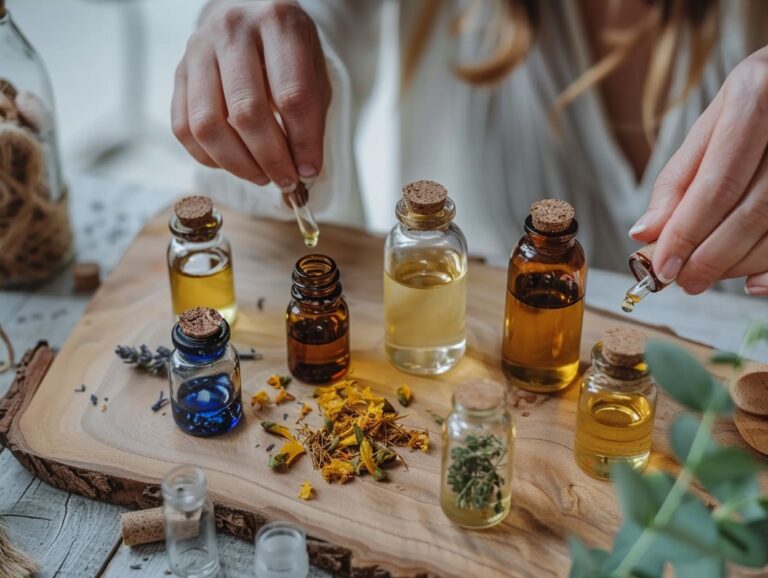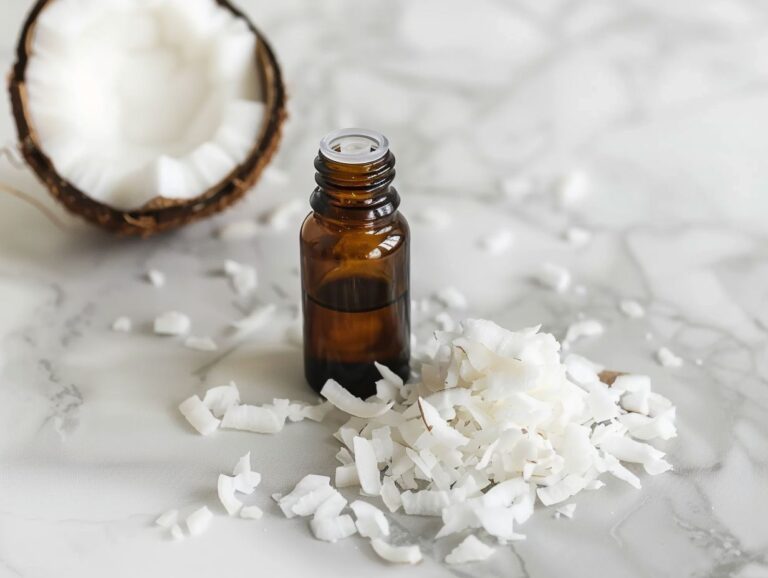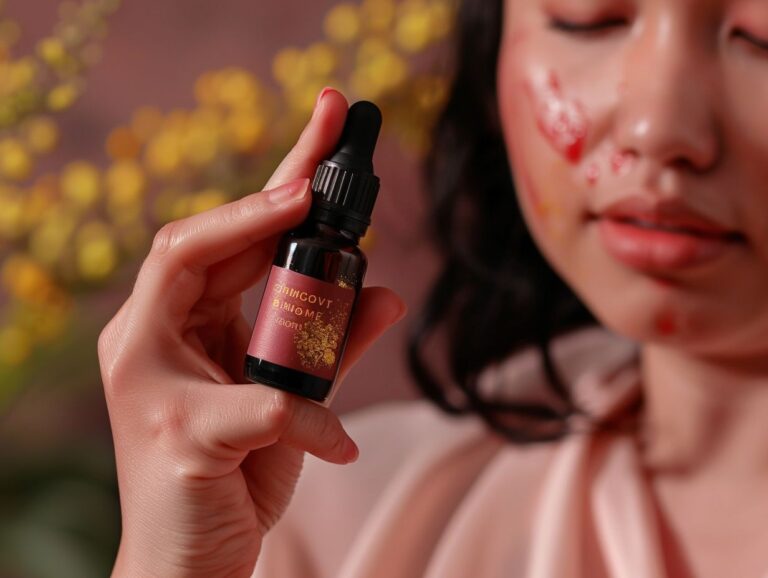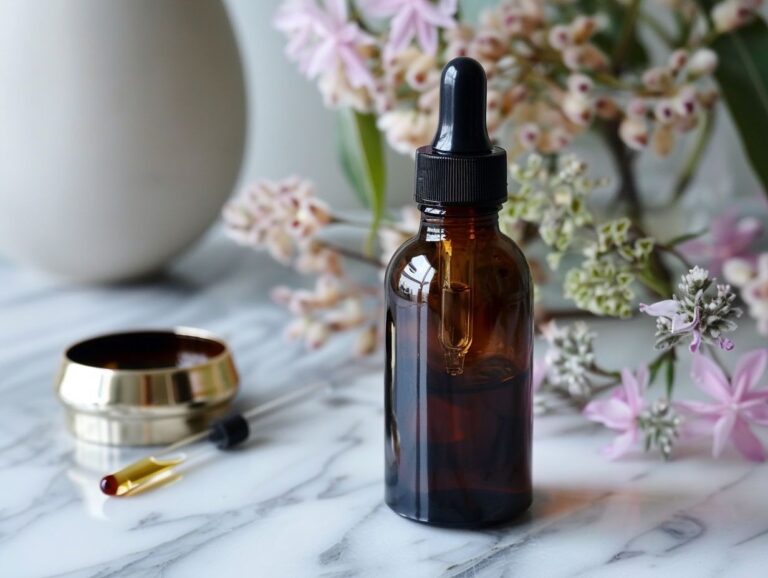Can You Use Essential Oils on Your Face
Curious about incorporating essential oils into your skincare routine?
We explore the world of essential oils and their safety for skin. Discover the different types of essential oils, the benefits and risks of using them on your face, and how to properly dilute and apply them.
Whether you’re looking to combat acne or slow down the signs of aging, we’ll also discuss the best essential oils for your specific skin concerns. Join us as we uncover the potential of essential oils for your skincare regimen.
Key Takeaways:
What Are Essential Oils?
Essential oils are concentrated liquids derived from plants and used in various applications such as aromatherapy, skincare, and health. Lavender oil and tea tree oil are popular examples that offer multiple benefits.
The extraction process of essential oils involves methods like steam distillation, cold pressing, or solvent extraction to capture the potent essence of plants.
- In skincare, essential oils are prized for their ability to address various skin concerns such as acne, dryness, and inflammation.
- Aromatherapy utilizes these oils to promote relaxation, improve sleep quality, and uplift mood through inhalation or topical application.
- Health benefits of essential oils range from boosting immunity to alleviating headaches and reducing stress levels, acting as natural remedies for various ailments.
Whether it’s adding a few drops of lavender oil to your bath for a calming experience or using tea tree oil as a natural antiseptic for skincare, these versatile oils have a wide array of applications in daily life.
Are Essential Oils Safe for Skin?
When used correctly and with proper dilution, essential oils can be safe for the skin. They are potent and may cause skin irritation or allergic reactions if not diluted or applied appropriately.
Essential oils should always be diluted with a carrier oil before direct skin application. A common rule of thumb is to use a two to three percent dilution for most essential oils. Popular carrier oils include coconut, almond, or jojoba oil, which help reduce the risk of adverse skin reactions.
Before using any essential oil on your skin, performing a patch test is crucial. Apply a small amount to a discreet area and observe for any redness, itching, or irritation. If any reaction occurs, discontinue use immediately. Can you wear essential oils on your skin?
For individuals with sensitive skin or skin conditions, consulting with a qualified aromatherapist or dermatologist is advisable. They can provide personalized recommendations and help you navigate the world of essential oils safely.
What are the Different Types of Essential Oils?
Essential oils come in a wide range of types, each with unique properties and benefits. An essential oil educator can help distinguish between oils suitable for aromatherapy, skincare, and other purposes.
Some popular essential oils include lavender, known for its calming and stress-relieving properties, peppermint for its invigorating effects, and tea tree for its antibacterial and antifungal qualities. Citrus oils like orange and lemon are prized for their uplifting scents.
Essential oil educators play a crucial role in guiding individuals on the safe and effective use of these potent plant extracts. They are knowledgeable about the therapeutic properties of each oil and can recommend specific blends for various applications.
Are Essential Oils Safe to Use on the Face?
Using essential oils on the face can be beneficial if done correctly as part of a skincare routine or beauty regimen. Incorporating suitable oils can enhance skin health and appearance.
When selecting essential oils for your face, it s crucial to consider your skin type. For example, lavender oil is known for its calming properties, making it ideal for sensitive skin, while tea tree oil is great for acne-prone skin due to its antibacterial qualities. Additionally, rosehip oil is rich in antioxidants, making it a fantastic choice for anti-aging benefits. The application method is also key – always dilute essential oils with a carrier oil to prevent skin irritation, and perform a patch test beforehand to ensure your skin reacts positively.
What Are the Benefits of Using Essential Oils on the Face?

Essential oils are rich in vitamins and antioxidants that penetrate deep into the skin, promoting hydration and boosting collagen production for a youthful appearance. They also possess anti-inflammatory properties, aiding in soothing irritated skin and reducing redness. Essential oils can help balance skin tone by targeting hyperpigmentation and promoting overall skin rejuvenation.
One of the key advantages of incorporating essential oils into a facial skincare routine is their versatility. Depending on your skin type and concerns, you can customize your blend of essential oils to cater to your specific needs. For instance, lavender oil is great for acne-prone skin, while rosehip oil is ideal for brightening and improving skin texture.
What Are the Risks of Using Essential Oils on the Face?
While beneficial, using essential oils on the face carries risks such as skin reactions if not properly diluted or applied. It’s essential to be cautious to prevent adverse effects.
It is important to remember that essential oils are highly concentrated plant extracts, and therefore, can be potent compounds that may cause irritation or sensitization when used directly on the skin without dilution. Proper dilution is crucial to ensure safety and effectiveness. Additionally, patch testing is a critical step in determining individual sensitivity to a specific oil before applying it to a larger area of the face. Choosing pure and high-quality oils helps reduce the likelihood of adverse reactions and maximize the benefits for your skin.
How to Use Essential Oils on the Face?
To use essential oils on the face, dilute them with a suitable carrier oil and perform a patch test to check for any skin irritations or allergic reactions before full application.
Once you have selected an appropriate carrier oil, such as coconut, jojoba, or almond oil, mix a few drops of your chosen essential oil with a teaspoon of carrier oil. This dilution is crucial as essential oils are highly concentrated and can cause skin irritation when applied directly. After dilution, apply a small amount of the diluted mixture on a patch of skin, like the inner forearm, and wait for 24 hours to assess for any adverse reactions. Remember, essential oils are potent substances, and proper dilution ensures safe and effective usage.
What is the Proper Dilution Ratio for Essential Oils on the Face?
The proper dilution ratio for essential oils on the face depends on the specific oil and individual skin sensitivity. Consulting an expert source or a skincare professional can help determine the ideal dilution.
Experts recommend starting with a lower dilution ratio, typically around 1% to 2% for facial application, especially for those with sensitive skin. This means adding only a few drops of essential oil to a carrier oil like jojoba or sweet almond oil for safety.
It’s crucial to consider the potency of the essential oil when determining the dilution ratio. Strong oils like cinnamon or oregano require higher dilution rates, while milder options such as lavender or chamomile are gentler on the skin and can be used at lower concentrations.
What Are the Best Essential Oils for Different Skin Types?
Different skin types require specific essential oils to address their unique needs. Blending oils can create customized solutions for various skin conditions and concerns.
For oily skin, tea tree oil and bergamot oil are excellent choices due to their antibacterial and astringent properties, which help to regulate sebum production and reduce acne.
Dry skin benefits from moisturizing oils like essential oils like rosehip oil and lavender oil, with their hydrating and soothing effects.
Sensitive skin types may find relief with gentle oils like chamomile oil and calendula oil that calm inflammation and provide a protective barrier.
Combining oils such as jojoba oil and geranium oil can be a great option for combination skin, balancing both oily and dry areas.
Can Essential Oils Help with Acne?

Essential oils have shown potential in helping with acne by reducing inflammation, addressing symptoms, and promoting skin healing. Certain oils are known for their antibacterial and soothing properties.
Tea tree oil is one of the most popular choices for acne-prone skin due to its strong antibacterial properties. Lavender oil is gentle and can help reduce redness and swelling. Additionally, essential oils for skin like rosehip seed oil is rich in antioxidants and can aid in skin regeneration.
When incorporating essential oils into your skincare routine, dilute them with a carrier oil like jojoba or sweet almond oil to prevent skin irritation. You can add a few drops to your moisturizer or create a DIY spot treatment for targeted application.
What Are the Best Essential Oils for Acne-prone Skin?
For acne-prone skin, the best essential oils include tea tree oil, lavender oil, and jojoba oil, known for their ability to combat acne-causing bacteria and reduce inflammation when applied topically.
Tea tree oil, with its strong antibacterial properties, can effectively target the bacteria that contribute to acne formation. Applying a diluted solution directly onto blemishes can help accelerate healing and prevent new breakouts.
Why Can’t You Use Essential Oils on Skin
Wearing essential oils on skin, Lavender oil, on the other hand, is renowned for its soothing and anti-inflammatory characteristics, which can calm irritated skin and reduce redness associated with acne.
Regarding jojoba oil, its similarity to the skin’s natural oils allows for gentle moisturization without clogging pores, making it ideal for balancing oily skin prone to breakouts. Using jojoba oil as a carrier oil for other essential oils can enhance their effectiveness while nourishing the skin.
How to Use Essential Oils for Acne?
When using essential oils for acne, it’s important to apply them topically after proper dilution to avoid adverse skin reactions. Regular application can help improve acne symptoms.
Consistency is key when integrating essential oils into your skincare routine. Choose suitable carrier oils like coconut or jojoba oil to dilute potent essential oils, ensuring they are skin-safe.
Spot testing is crucial when trying a new essential oil to check for any sensitivity or allergies. Always remember to follow recommended dilution ratios to prevent irritation.
Some popular essential oils for acne treatment include tea tree oil, lavender, and rosehip oil. These oils have antimicrobial and anti-inflammatory properties that can soothe inflammation and combat acne-causing bacteria.
Can Essential Oils Help with Anti-aging?
Essential oils can play a beneficial role in anti-aging skincare by providing hydration, promoting collagen production, and enhancing skin barrier protection. Certain oils possess anti-inflammatory and antioxidant properties.
For example, lavender oil is known for its moisturizing effects, which can help combat dryness and maintain skin suppleness. Rosehip seed oil stands out for its high vitamin C content, aiding in collagen synthesis for firmer, smoother skin. Frankincense oil is valued for its ability to strengthen the skin barrier, protecting against environmental stressors and reducing signs of aging.
What Are the Best Essential Oils for Anti-aging?
The best essential oils for anti-aging include rosehip oil, frankincense oil, and geranium oil, known for their rejuvenating properties, antioxidant content, and pleasant fragrance.
These essential oils are highly regarded in skincare routines for their ability to improve elasticity, reduce the appearance of age spots, and enhance overall skin tone.
- Rosehip oil is rich in vitamins A and C, essential fatty acids, and antioxidants, making it effective in firming the skin, combating free radicals, and promoting cell regeneration.
- Frankincense oil is valued for its anti-inflammatory properties, helping to soothe irritated skin, minimize fine lines, and promote a more youthful complexion.
- Geranium oil, with its astringent properties, can assist in tightening the skin, balancing sebum production, and improving skin texture.
Incorporating these oils into your skincare routine can contribute significantly to a more youthful and radiant appearance over time.”
How to Use Essential Oils for Anti-aging?

When using essential oils for anti-aging purposes, it is important to dilute them properly to avoid skin irritation. Carrier oils such as jojoba or coconut oil can be mixed with a few drops of essential oils like rosehip or frankincense for a safe and effective application.
For facial massages, start by applying a small amount of the diluted oil blend to fingertips and gently massage onto the skin using circular motions. This not only helps in better absorption of the oils but also stimulates blood flow, promoting a healthy glow.
Frequently Asked Questions
Can You Use Essential Oils on Your Face?
Yes, you can use essential oils on your face. However, it is important to use them correctly and with caution.
Are All Essential Oils Safe to Use on Your Face?
No, not all essential oils are safe to use on your face. Some may cause irritation or allergic reactions. It is important to do your research and consult with a professional before using essential oils on your face.
What Are the Benefits of Using Essential Oils on Your Face?
Using essential oils on your face can provide numerous benefits such as improved skin texture, reduced inflammation, and increased hydration. It can also help with specific skin concerns like acne or aging.
Which Essential Oils Should I Avoid Using on My Face?
There are a few essential oils that should be avoided when using them on your face, such as cinnamon, oregano, and clove. These oils are known to cause irritation and should be used sparingly or not at all on the face.
How Should I Dilute Essential Oils for Use on My Face?
Essential oils are highly concentrated and should always be diluted before use on the face. A safe dilution ratio is 1-2 drops of essential oil per 1 tablespoon of carrier oil. This will prevent any potential irritation or skin sensitivity.
Can You Use Essential Oils on Your Face Every Day?
It is not recommended to use essential oils on your face every day. Since they are highly concentrated, daily use can cause irritation or sensitization over time. It is best to use them 2-3 times a week and always patch test before use.








One Comment